Roz Morris's Blog, page 106
September 18, 2011
Episode 4: The Storm
 'If I could get my hands on episode 4, it would be great. Except I'll have to wait until the 19th of September. How very frustrating.'
'If I could get my hands on episode 4, it would be great. Except I'll have to wait until the 19th of September. How very frustrating.'
It's here. The 19th. And the finale to My Memories of a Future Life. Find it here if you're in the UK, here if you're in most of the rest of the world and here if you're in Germany. And thank you, Germany, for making my novel number 1 in reincarnation. I think that should go on a T-shirt.
If all this is double-dutch, you can start at episode 1, or listen to a free audio of the first 4 chapters over on the red blog.








Writers in control of their destinies… Back at Everything again
 Almost a week without a post and several come along within minutes of each other. Sorry about that. As well as nattering about stories here, I'm also talking to poet and independent publisher Chila Bradshaw Woychik. We delve into serious matters such as my favourite movies (she eventually had to put a gag on me), my four-hooved pet, and terribly frivolous ones such as the future for writers in a fragmenting publishing industry. Find part 1 here, and hop over to Chila's place for part 2.
Almost a week without a post and several come along within minutes of each other. Sorry about that. As well as nattering about stories here, I'm also talking to poet and independent publisher Chila Bradshaw Woychik. We delve into serious matters such as my favourite movies (she eventually had to put a gag on me), my four-hooved pet, and terribly frivolous ones such as the future for writers in a fragmenting publishing industry. Find part 1 here, and hop over to Chila's place for part 2.








Spoilers – missing the point; a story is more than an ending
 'Research has found that giving away the best part of a story at the beginning actually makes it more enjoyable.' So says a report in Scientific American, August 14 2011.
'Research has found that giving away the best part of a story at the beginning actually makes it more enjoyable.' So says a report in Scientific American, August 14 2011.
This study, which you may or may not have seen discussed around the blogoverse, found that revealing the end of a story made people enjoy the whole thing more. Vader turns out to be Luke's father. Rhett walks out. Reader, she married him.
What's going on? (Apart from a certain amount of literary vandalism.) And what does this tell us as writers?
The best part
The clue is in the statement from the Scientific American report – that the end was the 'best part'. Here's where they profoundly misunderstand what we get from a story. There's a lot more to it than the ending.
Sometimes the ending is obvious anyway. If you think about it, we know Buffy will triumph at the end of each season. The question is how? What, in the course of getting there, will happen to the people she cares about? How will getting to the end change her, her life and her relationships? What reserves will she have to find in order to get to that end-point? What did she fail at, in the beginning, that makes this ending satisfying on a profounder scale than simply beating a bad guy?
A story is more than a mere outcome. The story is what happens along the way.
A real spoiler would give that away. It would home in on the aha moments where the narrative flips direction, or the main character has a realisation that turns everything on its head. When a story does this well, we enjoy them because we earn them, in step with the characters. The pleasure is making the discovery at the right time and in the right place. You could really louse up a reader's day if you revealed those out of turn.
In fact, some endings sound positively lame, taken out of context. The ending-spoiler of Austin Wright's Tony and Susan might be 'Susan reached the end of the book and was suitably rattled'. Big shrug. So what? But read the book as you're supposed to, page by page, and you close it as disquieted as Susan. (If you want to know more about the book, here's my review of it, on Guys Can Read.
The study participants enjoyed a story more after hearing the spoiler?
So we've argued with the definition of 'best bit'. But why did the readers enjoy the story more if they were told the end?
Who knows? The researchers speculated that spoilers made the story easier to follow. But there are stories we enjoy again and again. Second time around we might see things we missed first time, and can also appreciate the moments where the writer foxed you into looking at one hand while they yanked the rug away with the other. Perhaps it shows how much readers enjoy dramatic irony, where they are more knowledgeable than the characters embroiled in the tale. And perhaps it shows that a great story sucks you in and hypnotises you into the journey, regardless of what you remember about it.
It's not the end that matters most. It's every moment of getting there.
Thank you, Phineas H on Flickr, for the photo
In similar spirit, I have an ending of my own to reveal – and not a moment too soon, judging by the emails that have been flying into my inbox. The finale of My Memories of a Future Life goes live at midnight, UK time – which means some of you American folks can get it before you snooze tonight. It's called The Storm. You can find episode 1 here, episode 2 here and episode 3 here. For those of you who prefer print, there's a print copy tunnelling through the works at CreateSpace to emerge at some point next week. And as always, you can try the first four chapters on a free audio here








September 11, 2011
Like Ruby – Episode 3 is here
 'Is it the 12th yet?' 'What do I have to do to get episodes 3 and 4 right now?'
'Is it the 12th yet?' 'What do I have to do to get episodes 3 and 4 right now?'
Thank you, lovely readers and reincarnation time travellers. You can't have episode 4 yet. Not for another week. But you can have episode 3.
Download My Memories of a Future Life: Like Ruby here (UK) and here (USA and everywhere else)
You can find episode 1 here, episode 2 here and you can try the first four chapters on a free audio here








I rewrote my novel through a critique group but I've lost my way
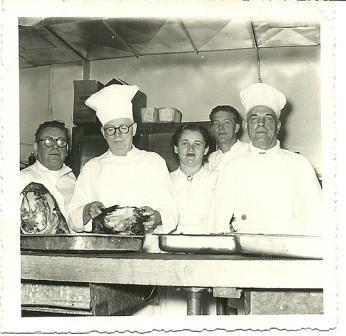 Critique groups are a great way to develop a critical sense and to experiment with what works. And to meet other people who are as dedicated to writing as you are. But too many cooks…
Critique groups are a great way to develop a critical sense and to experiment with what works. And to meet other people who are as dedicated to writing as you are. But too many cooks…
I've had this email from Vanessa, which is a fairly common problem.
During the past 12 months, I rewrote my novel 8 times as part of a critique group, and now I'm wondering if I should just go back to my first draft and start over. My book is different now, in some ways better, in some ways worse. I'm not even sure I can work with it in its present, 8th incarnation. I'm feeling a bit discouraged and don't know how to recapture the original freshness. I think there are some good changes in the revisions, but also a lot of bad direction. How will I sort through it?
Discounting the fact that some of the advice might be misguided, inept or even destructive, even the most accomplished critiquers will offer different approaches when they spot a problem. You get a lot of input and you don't know which to ignore. You try to knit them into a coherent whole and then realise you're lost. And the idea is worn to shreds.
A brainstorming draft
If you're feeling like Vanessa is, you have to see this as is a brainstorming draft. It's full of other people's solutions – some good for your book and some a bad fit.
A learning draft
It is also a learning draft – in it you learned how to sketch a character, how to show instead of tell, how to introduce back story without clogging the pipes, how to pace. You could almost view some of it as exercises that have helped you to write better – but some of those exercises will not be pieces that need to be in this book.
Take control
Now you will undoubtedly be more practised and more aware. You need to take control of this brainstorming/apprenticeship draft and make a novel out of it again.
As a BTW: one thing you find as you grow as a writer is that other people's solutions are rarely right for you. You have to pay close attention to the problem they have identified rather than what they tell you to do. If lots of people are saying something is wrong it probably is. But their solution is probably not right for you, even if they're an accomplished writer.
Get back to your vision of your book
First of all, have you had a break from the novel? Here's how you can tell. Do you view most of the manuscript as a problem? If you read it through right now would you be beating yourself up for what's not going right?
Put it away so that you can read it without wanting to have a row with it.
When you're ready, don't read that latest version. Find the material from before the crit group, when it was just you and your idea. I always advise authors to keep their first draft because although there will be much to blush about, there will also be glorious tumbles of inspiration. What can vanish after multiple revisions is the raw inspiration and even if you didn't express it well when you first wrote it down, the spirit of it is usually there.
Read through this and enjoy your original idea. Look out for the interesting edges that have been smoothed away and make a file of them.
Now to your manuscript
Then read the latest version. Make a copy so you can mess about with it. Paste into a new file the sections that your gut wants to keep and that you feel are an improvement on what went before. Clip away those you feel don't belong – but don't junk them because they may be useful later or for another book. Don't try to rework anything yet – just examine what's already there.
Any sections you don't mind about either way should stay in the original file. You now have 4 files:
1 initial gems with rough edges
2 gems from the reworked version
3 don't-minds
4 rejects.
File 2 is your new essentials for this story. Now work out where the gaps are and how you're going to join the dots. Yes it's very much slimmer than the draft file, but it's what you like about the book, in concentrate. Look at file 1 and consider how to add its contents in. Look at your 'don't mind' file and figure out if you could work up any of the elements to fit with the new vision. From this you'll build a new book that you do like from a draft you're ratty about.
If you're going to play with the story order a lot, you might find it useful to play the cards game from Nail Your Novel. If you're not going to reorder you don't have to worry about this.
Feedback is essential, of course, but you can get lost. This especially happens if you're feeling your way, as first-time novelists are. While you have been writing with group feedback you have been putting the controls as much in their hands as your own. Now you've grown up a little, you have to close the doors, get to know the novel again and plan how you're going to do justice to it.
Have you had experience revising with critique groups? And what would you tell Vanessa? Share in the comments
Thanks for the pic Hugo 90 on flickr
My Memories of a Future Life: episodes 1 and 2 available now. Episode 3 will be out on 12th September. The print edition will be available at the end of September. Do you like podcasts? You can listen to or download, free, the first 4 chapters








September 10, 2011
How to prepare your Kindle text for a print edition – Part 2: chapter head styles and cleaning up the text
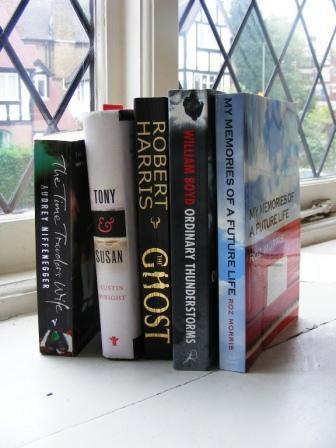 Yesterday I discussed how to choose the size of your book and the typeface. Today, we finish your book's interior
Yesterday I discussed how to choose the size of your book and the typeface. Today, we finish your book's interior
Fancy stuff like chapter heads
You can leave the chapter title in the same font as your body copy, or you might want something eye catching to draw the reader to the first line – maybe a motif or a drop capital. (Designing this deserves whole posts by itself; there are trillions of ways to do it, but the short answer is to find a book you like the look of in a similar genre and copy that). You might want a different font (not too fancy, please). I used Copperplate Goth BT.
Unless you have a fantastically good artistic reason, don't use more than one heading font besides your body copy. Books look better if typefaces are inconspicuous and style is uniform. A little contrast is allowable in chapter headings, but if you have more than two typefaces it looks like it was made by someone under a responsible age.
Chapter titles don't usually begin at the very top of the page. You'll want to add line spaces, both above the chapter heading and afterwards, before the actual text starts. Experiment until you find an arrangement you like. Then write down exactly what it is – eg 3 carriage returns above and 2 below. You need to do it exactly the same in all the chapters. Properly typeset books are consistent about everything.
Similarly between sections that aren't chapter breaks you'll need a gap. How many lines do you want them to be? Do you want a little motif in the middle to delineate them? What about the paragraphs? Do you want them full out after a section break? Full out (ie not indented) is the usual option but I have seen indents work nicely as well. Make your decision, write it down – and do the same thing every time.
Then go through the manuscript and put them in.
If you formatted for Kindle you probably put page breaks in for chapter endings. If you formatted for other strains of epub you probably didn't use page breaks. Go and put page breaks in for chapter endings now. If you try to split the book with carriage returns instead of page breaks, the next stage will do your head in. And make you resort to far more flabbergasted language.
Blank pages and front matter
Use page breaks to make blank pages too. And strip off the folio on blank pages if your program allows, or change the text colour to white so it doesn't print.
Where do you want blank pages? Certain parts of your book must begin on right-hand pages, so you might have to put blanks in to achieve this – especially at the front.
Before you get to the text proper you need a few bits of set-up copy, known as front matter. Look in any published book and you'll see. Usually these are:
half title (right-hand page) – where you can put biographical info too
copyright notice and ISBN etc (left-hand page)
full title (right-hand)
either blank or acknowledgements (left-hand page)
start of book (right-hand page) or part 1/section 1 title page (right-hand page, then blank, then text proper on right-hand page)
Widows, orphans – the mysterious faffing I was leaving until last
Now you have the biggest, dreariest task of all. You have to look for bad breaks at the tops of pages – widows, orphans and stumps.
Widows and orphans are short lines in places you don't want them – at the very bottom of a page or the very top. Stumps are words broken by a hyphen so that the first half of the word is on one page and the second half is on the next. All these can look ugly, although sometimes you can get away with one if there's enough text on the rest of the page – it's very much a matter of personal taste what's acceptable and what isn't.

Get this line back or make it longer...
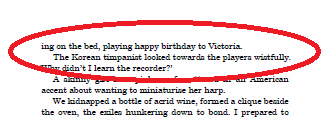
... but this is okay

All on their own... take these lines back or push a few more over...

... like this
You also have to look for section breaks in awkward places. If you have a section break, you want more than one line below it or it looks weird. And you don't want a page with just 1 or 2 lines hanging in mid air and then the chapter end.
NB – most word processing programs have auto settings to get rid of these pesky widows and orphans. Turn it off. It results in short pages, which in a text-heavy book like a novel looks dreadful. Yes, you have to do this bit by hand.
How?
NOT by squeezing the fonts together – that looks awful. NOT by sneakily changing the point size or the leading – it shows. You have to alter the text itself.
Remember when I said this isn't about the text any more, it's about how it looks? That's what I mean.
Close up paragraphs, make new ones, cut out extraneous words to pull a line back, add a few to push one over. If you have sub-headings (weird in novels but de rigeur in non-fiction) put one in or take one out. If there's no scope to edit on the page you're on, go back a page and see if you can do it there. Sometimes you may have to go back a few. And keep checking the results.
This is the drudge. You have to do this for every single page. It's fiddly. And this is why you want to have established all your other design decisions before you get here. Because you don't want to have to do it all over again. And this is why you need to separate your chapters with page breaks, so that any change you make is confined to just a few pages. If you use carriage returns instead of page breaks, every change you make will affect the rest of the entire book.
You might wonder how you spot all these things. I do it automatically because I've done it for years. I can read the text and see all these things at the same time. (Hell, I scan for them when I'm reading other people's books.) I can adjust the text so that it's true to what I want to say and also looks typographically acceptable. In fact, because I knew I'd have to do this, I made my last major edits of My Memories of a Future Life in PagePlus so that the text would be identical to the Kindle version.
If you're not practised at this it's best to do several passes through the book, looking for one problem each time, until you get your eye in. And this exhaustive level of nit-picking might be one of the reasons you decide to hand this part of the project over to someone who can do it much faster than you can, and more thoroughly.
Once each of your pages looks typographically beautiful, proof-read it one last time, remembering to check that your chapter breaks are consistent – and your text is ready to go.
If you have a Kindle book you'll have a front cover but you won't yet have a back one. And you've probably got quite enough to do for now – so I'll tell you how I designed mine in a future post.
Have you released one of your books in print form? Did you do the production yourself? If you have any tips to add or nightmares to share, I'd love to hear them!
My Memories of a Future Life: episodes 1 and 2 available now. Episode 3 on 12th September. Print edition end September. Do you like podcasts? You can listen to or download, free, the first 4 chapters








September 9, 2011
How to prepare your Kindle text for a print edition – Part 1: book size and typeface
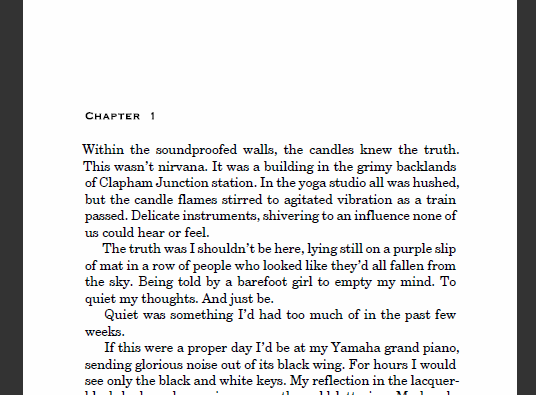 While making an ebook is pretty straightforward, putting it into print is a pain. In traditional publishing houses, it's an entire department's job – because there's a lot of invisible fiddling you need to do. (It used to be my job too, which is why I know.)
While making an ebook is pretty straightforward, putting it into print is a pain. In traditional publishing houses, it's an entire department's job – because there's a lot of invisible fiddling you need to do. (It used to be my job too, which is why I know.)
But it is possible to do it well, given the right instructions. I'll walk you through what I did to get the text of My Memories of a Future Life ready for print. Be prepared – this will get pathologically nitpicky. And this stage is not about how the text reads – it's about how it looks. Yes, to writers that's the tail wagging the dog. Get over it now.
It's quite a big job so I'll split it in two posts. Today: choosing the size of the book and the typeface.
What size do you want the book to be?
Choose this first, because that governs how much you get on a page. Nail Your Novel is a short book at 40,000 words, and the first time I put it out was at 6×9. That made it look flimsy, so when I redesigned the interior I sized it down to 5×8 where the thickness and size feel just right.
My Memories of a Future Life, on the other hand, is a whopping 103,000 words. It would be rather chunky at 5×8 and expensive to produce because of the weight – which means I would have had to charge a lot more and everyone would think I was being greedy. Many literary novels are now being produced in 6×9 size, or even bigger – so it fits nicely with the genre.
If you use CreateSpace you can download a Word template for the interior. It sets up page sizes and margins so that everything looks right and you can do your fiddling in Word. Catherine Ryan Howard's book Self-Printed has a detailed section on how to do this. There are other POD companies besides CreateSpace, but they're not as easy to use. I used CreateSpace but with a design program, PagePlus, because it's what I do my covers in and because my version of Word doesn't make PDFs. (For CreateSpace and Lulu you submit your book on a PDF.)
PagePlus sets automatic margins as well, but the default ones are too narrow so I customise them. If you're using anything other than CreateSpace's template I suggest you check your margins too. They may have been set up for leaflets, not paperback books.
Before you finalise your margins, whack some dummy text onto the page, print it out and put it over an existing book of the same size to check it looks okay.
Important: get your margins right now. If you change them later you'll have to redo a lot of tedious checking.
Text
When you formatted the Kindle or ebook edition you probably established a style for the book…. didn't you? You're consistent about when you use single or double quotes, proper em dashes and so on? You checked you had curly quotes and not ticks, including on the apostrophes? You've never thought about it? Go and fix them now. They'll make your book look a lot more professional.
Typeface
Choose this next. And make your decision final. Every typeface is a slightly different width, even if it's the same height.
Don't use Times, it makes a book page look like a business proposal.
Obviously don't use any of the fancy curly things that seem to have been supplied to design party invitations.
Get down a few novels in your genre (tastes in typefaces may vary between genres) and choose typefaces that look like them. I used Century Schoolbook BT for My Memories of a Future Life.

Italics: flat feet bad
Check what the font's italics look like. A lot of computers come with the Roman version of fonts but not the italics, and when you hit the little I icon it slants them. True italics have curled serifs (the little feet), and slanted feet look wrong. If you haven't got the italic version of your font there are free places to download it – I found my itals here. Do this now too, for the mysterious tedium-avoidance reason I will explain.
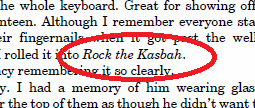
Italics: curly feet good
Typesize and spacing
Most books are set in 12pt, or 11.5pt. Again, compare with other published books in your genre (for instance, literary can afford to go slightly smaller than YA).
If your book is 6×9 the page is quite wide, so you might want a bigger typeface or wider leading (space between the lines) to make it more readable. You can fine-tune this by editing the paragraph style – I set the leading as a percentage of the pointsize. So I had 11.5pt type on a leading that was a niftily precise 14.375pt – or 125% of the point size.
And each typeface has different properties. Some have tall ascenders and descenders (vertical strokes). So if you change from one font at 11.5pt it might look much smaller and less readable than another, so you might need to use it bigger. Before you finalise, print a page out and fold it around a book of the same size to see how it looks in the flesh.
When you've decided, run your text in and typeset it.
Part 2 tomorrow: chapter heads… and the really nitpicky stage
Have you released one of your books in print form? Did you do the production yourself? If you have any tips to add for this stage, I'd love to hear them!
My Memories of a Future Life: episodes 1 and 2 available now. Episode 3 on 12th September. Print edition end September. Do you like podcasts? You can listen to or download, free, the first 4 chapters








September 4, 2011
When to keep your distance: why you don't always want the reader in the thick of the action
 Most of the time we're trying to put readers in the thick of the characters' experience. But distance is also an interesting fictional technique with a power all of its own.
Most of the time we're trying to put readers in the thick of the characters' experience. But distance is also an interesting fictional technique with a power all of its own.
In Hitchcock's film Torn Curtain, there's a scene where the protagonist kills a taxi driver. Normally you'd expect scenes like this to be presented in close up. We'd see the struggle, the driver's desperate fight and the hero's anguish in taking someone's life. We might wonder what the outcome will be.
But that's not what Hitchcock does. The scene is shot from a distance, as though it is happening to someone across a road. Almost as if it's not even happening to the protagonist.
There are no questions about whether the MC will succeed. The driver is killed, and that is that. The MC doesn't even pay a price by getting hurt. He doesn't flinch from what he has to do. The distance of the camera plays with our empathy, representing how the characters distanced themselves from the deed. And so we see a normal, married man forced to kill an innocent stranger in cold blood. We see the resources he has in his soul that will ensure he survives. What does it do to the viewer? It makes us complicit in an uncomfortable world. As if we have made that choice too.
In Persuasion, Jane Austen shows the final reunion between the lovers as though she's filming it at a distance. It's surprising, but allows the characters privacy in their moment – which is all the more touching.
Of course, you need to use distance carefully. I often see scenes where writers duck out of showing a key event, possibly because they didn't feel up to writing it. There is a strong likelihood that if you pull the prose camera away, the reader will feel cheated. You have to make a careful judgement call. If there are any questions lingering, the reader needs to see what happened. But if the reader can fill all the blanks and be just as satisfied, it might be powerful indeed.
Every event we share in a story has an effect beyond just showing what happened. And distance can sometimes lend more power than a close-up. Like Hitchcock, you could create an interesting complicit effect, show characters turning a corner. Result? The audience is disturbed in a way that is far more complex and chilling. Jane Austen had spent so long keeping her lovers apart that we wanted them to be together. When they finally were she went one better – she allowed them to be totally alone. Result? Reader satisfied.
That's just two examples. Give me yours and tell me why you think they work!
 Oh, and (spoon tapping glass). My Memories of a Future Life is getting great reviews. Episode 2: Rachmaninov and Ruin, is limbering up for release on Amazon at midnight as 4th September turns into 5th. You can find episode 1 here and you can try the first four chapters on a free audio here
Oh, and (spoon tapping glass). My Memories of a Future Life is getting great reviews. Episode 2: Rachmaninov and Ruin, is limbering up for release on Amazon at midnight as 4th September turns into 5th. You can find episode 1 here and you can try the first four chapters on a free audio here








'Spellbinding… I was hooked…' Rachmaninov and Ruin out now
 My Memories of a Future Life, Episode 2: Rachmaninov and Ruin, is in the Kindle store.
My Memories of a Future Life, Episode 2: Rachmaninov and Ruin, is in the Kindle store.
Everyone who's reading it is telling me on emails, Facebook, Twitter and in reviews where they think the story is going, what crumbs they're following and what their hopes for it are.
This is so interesting. The size of print novels was largely dictated by the economics of production and distribution, which meant it didn't pay to release fiction that was too long, or too short, or even serialised. But the Kindle has none of these constraints, and it can connect through social networks too. Through Kindle, people can gather around campfires and enjoy stories as a communal experience and it will only get better. It's going to be so exciting to see what new storytelling forms we get in the next few years.
Anyway, around our own little campfire, Part The Second has arrived. For .co.uk click here and .com find it here. To listen to a free audio trailer of episode 1 (35 minutes), go here.








September 1, 2011
Download free audio trailer of the first 4 chapters
 'Spellbinding… hypnotic… groundbreaking…' My Memories of a Future Life is getting rather fab reviews on Amazon – thank you! If you're curious what all the fuss is about, you can listen to the first four chapters right now!
'Spellbinding… hypnotic… groundbreaking…' My Memories of a Future Life is getting rather fab reviews on Amazon – thank you! If you're curious what all the fuss is about, you can listen to the first four chapters right now!
Download now – this link will take you to a google Docs page and you can download the MP3. file size is 12MB.
If that file is too big, there's a more compressed version here, but the sound quality isn't as good. Try the other one first!
You can also stream it here at Soundcloud:
Special thanks to Barry Brimer at BeOriginal.com for masterful file compression and for bringing the text alive with footsteps, thunderstorms, passing trains and a soupcon of piano. If you need a sound file sweetened (as they call it in the trade), he's your guy.
You can buy Episode 1 on your Kindle here for the UK and here for the US











